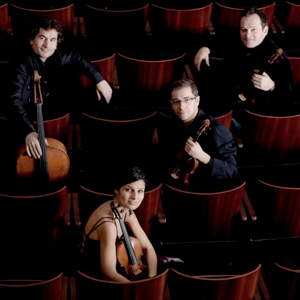by Mike Telin

On Tuesday, October 18 at 7:30 pm, the Belcea Quartet — Corine Belcea and Alex Shacher, violins, Krzysztof Chorzelski, viola, and Antoine Lederlin, cello — will return to the CCMS stage at Plymouth Church in Shaker Heights.
“This year our season’s theme is the music of Schubert and Shostakovich,” Krzysztof Chorzelski said during a telephone conversation from London. “We wanted to play our favorite music by these two composers because we feel they have something in common.”
The Quartet will open their program with a work that has been in their repertoire for many years, Schubert’s early Quartet in E-flat, D. 87. Chorzelski described the piece, written when the composer was 15 years old, as a fresh and beautiful gem in the Classical style of Haydn and Mozart. “At the same time, it is a little more Italian than the works of those two composers,” the violist noted. “You can sense the influence of Salieri, who was Schubert’s teacher at the time. Schubert thought his one failure was that he never made it as an opera composer. Perhaps he didn’t realize his enormous achievement when he created his Lieder. We recorded the D. 87 quartet on one of our early discs, and now we’re revisiting it with our two newer members, Antoine and Axel. It’s nice to go back to it and have their new input.”
The evening will conclude with another work by Schubert, the Quartet in G, D. 887, which Chorzelski described as hovering on the verge of insanity at times, and a bold departure from anything the composer had ever written. “It couldn’t be further away from D. 87. These two quartets are separated by thirteen years, and it’s unbelievable what happened to music during that time. Music changed so much, and that is reflected in this quartet. It’s similar to what happened with Beethoven — both composers’ late music is very different from their early works. This is also a piece that has been with us for a very long time, and every night we perform it, it is an epic journey.”
In between the Schubert bookends, the Belcea will turn to one of the most celebrated string quartets of the 20th century, Shostakovich’s Quartet No. 8 in c, Op. 110, a work the composer wrote as an epitaph for himself. “That’s not in the official title of the piece, but apparently that was his intention,” Chorzelski said, “and musically, it’s quite clear that it is autobiographical. Although Shostakovitch’s harmonic language is different, the directness, the honesty, and the bittersweet sadness of his music is not that far away from Schubert.”
Unlike the two Schubert quartets, the Belcea resisted learning the Shostakovich until recently. Chorzelski said the group has an interesting relationship with the Russian composer — some of his works they love, and others not so much. “It could be that we just needed more time to come to grips with his music. We always considered this quartet to be a very important piece, but because it is played so often, I think it was a natural reaction to steer clear of it for as long as we did. But things changed, and now we’re very happy that we’re playing the work. We quickly decided that it will stay in our repertoire for this season, and will remain there into the future. We’re happy to bring it to Cleveland.”
When they’re not touring, the Belcea dedicate much of their time to mentoring young quartets and piano-based chamber ensembles through the Belcea Quartet Trust. Chorzelski explained that they created the Trust in part as an homage to their mentors, the Amadeus and Alban Berg Quartets.
“We feel so privileged to have had a close relationship with those groups, not only musically, but more importantly, on a human level. We appreciate how much they gave us, and we felt it was time for us to begin the process of passing on the chamber music traditions they had instilled in us to the younger generations.”
In starting the Trust, the Belcea also wanted to create a program that would operate independently from a larger school of music. “In our experiences, we never had the opportunity to fulfill our aspirations the way we wanted, because we were always part of an institutional agenda that was not really focused on chamber music.”
Chorzelski explained that the program is offered free of charge, and is crafted to meet the needs of each ensemble. “We choose groups that are already quite active and have the desire to develop, and we let them propose what it is that they want from us. Each year we invite about three groups from across Europe, some of whom are veterans from previous years. But this year we took on two new groups, a piano trio and a piano quartet.”
Published on ClevelandClassical.com October 12, 2016.
Click here for a printable copy of this article


